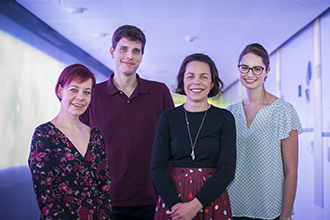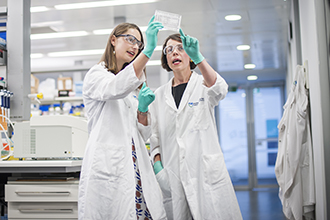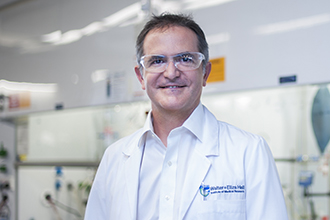Hyslop SR, Corbin J, Gangatirkar P, Lebois M, Au AE, Moujalled D, Pleines I, Sutherland KD, Andrews RK, Gardiner EE, Alexander WS, Josefsson EC. A glycoprotein VI signaling defect in newly formed platelets generated in stress thrombopoiesis. Journal of Thrombosis and Haemostasis. 2025;23(6):10.1016/j.jtha.2025.02.035
Chen T, Ashwood LM, Kondrashova O, Strasser A, Kelly G, Sutherland KD. Breathing new insights into the role of mutant p53 in lung cancer. Oncogene. 2025;44(3):10.1038/s41388-024-03219-6
Ng J, Cai L, Girard L, Prall OWJ, Rajan N, Khoo C, Batrouney A, Byrne DJ, Boyd DK, Kersbergen AJ, Christie M, Minna JD, Burr ML, Sutherland KD. Molecular and Pathologic Characterization of YAP1-Expressing Small Cell Lung Cancer Cell Lines Leads to Reclassification as SMARCA4-Deficient Malignancies. Clinical Cancer Research. 2024;30(9):10.1158/1078-0432.ccr-23-2360
Chen T, Lieschke E, Scott L, Boyd D, Sutherland K, Strasser A, Kelly G. Abstract LT06: Understanding the Role of Mutant TP53 in Lung Cancer Using Novel Genetically Engineered Mouse Models. Cancer Research. 2024;84(8_Supplement):10.1158/1538-7445.fcs2023-lt06
Ng J, Pan E, Johnston A, Ribera NT, Kersbergen A, Hess JB, Best SA, Tsui E, Steinfort D, Sutherland KD. A Multiplexed Approach to Assess Small Cell Lung Cancer Subtype Heterogeneity in Primary and Patient-Derived Tumor Samples. Methods in Molecular Biology. 2024;2806:10.1007/978-1-0716-3858-3_10
McDonald JA, Boyd D, Diepstraten S, Scott L, Tai L, Kueh A, Burr M, Best SA, Herold MJ, Sutherland KD. Abstract A043: Identifying critical vulnerabilities that sensitise Lkb1 -mutant lung adenocarcinoma to T cell mediated killing. Cancer Immunology Research. 2023;11(12_Supplement):10.1158/2326-6074.tumimm23-a043
Zeissig MN, Ashwood LM, Kondrashova O, Sutherland KD. Next batter up! Targeting cancers with KRAS-G12D mutations. Trends in Cancer. 2023;9(11):10.1016/j.trecan.2023.07.010
Weeden CE, Gayevskiy V, Marceaux C, Batey D, Tan T, Yokote K, Ribera NT, Clatch A, Christo S, Teh CE, Mitchell AJ, Trussart M, Rankin L, Obers A, McDonald JA, Sutherland KD, Sharma VJ, Starkey G, D’Costa R, Antippa P, Leong T, Steinfort D, Irving L, Swanton C, Gordon CL, Mackay LK, Speed TP, Gray DHD, Asselin-Labat M-L. Early immune pressure initiated by tissue-resident memory T cells sculpts tumor evolution in non-small cell lung cancer. Cancer Cell. 2023;41(5):10.1016/j.ccell.2023.03.019
Wang Z, Hu H, Heitink L, Rogers K, You Y, Tan T, Suen CLW, Garnham A, Chen H, Lieschke E, Diepstraten ST, Chang C, Chen T, Moujalled D, Sutherland K, Lessene G, Sieber OM, Visvader J, Kelly GL, Strasser A. The anti-cancer agent APR-246 can activate several programmed cell death processes to kill malignant cells. Cell Death & Differentiation. 2023;30(4):10.1038/s41418-023-01122-3
Wang Z, Hu H, Heitink L, Rogers K, You Y, Tan T, Suen CLW, Garnham A, Chen H, Lieschke E, Diepstraten ST, Chang C, Chen T, Moujalled D, Sutherland K, Lessene G, Sieber OM, Visvader J, Kelly GL, Strasser A. Correction to: The anti-cancer agent APR-246 can activate several programmed cell death processes to kill malignant cells. Cell Death & Differentiation. 2023;30(4):10.1038/s41418-023-01137-w






